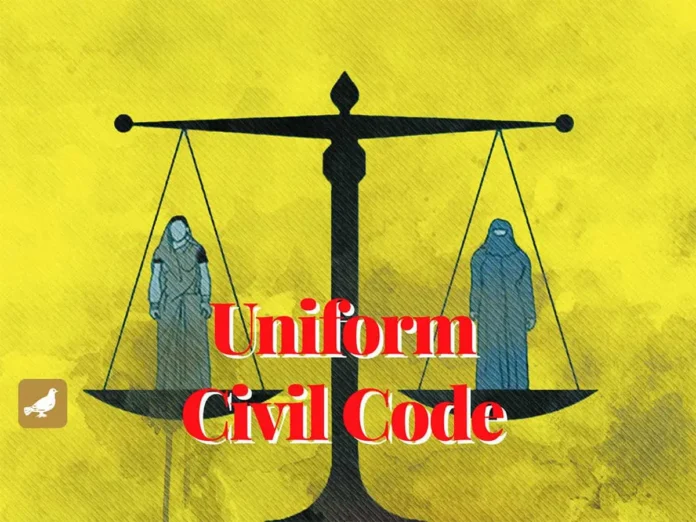This is a crucial issue in Indian politics concerning secularism, and it has become controversial due to the political left, Muslim groups, and other conservative religious groups and communities defending Sharia and religious customs and traditions

Niraj Krishna
I personally fail to comprehend why any religion should be given such vast, expansive jurisdiction. In doing so, religion would interfere with every aspect of life and prevent legislation from intervening in those areas. What is the purpose of our freedom? Our societal structure is rife with inequality, discrimination, and other issues. We have been granted this freedom so that we can address and rectify the areas where our fundamental rights are in conflict with the prevailing social system. – Dr. Ambedkar
The Uniform Civil Code is a legal framework related to social matters, applying equally to people of all faiths in areas such as marriage, divorce, maintenance, inheritance, and adoption. In other words, the essence of the “Uniform Civil Code” is that there should not be different civil laws for different faiths. It supersedes all private laws of any community or caste. In 1930, Jawaharlal Nehru, despite advocating for a Uniform Civil Code, faced opposition from senior leaders.
This is a crucial issue in Indian politics concerning secularism, and it has become controversial due to the political left, Muslim groups, and other conservative religious groups and communities defending Sharia and religious customs and traditions. Personal laws are distinct from public laws in India. Meanwhile, Article 25-28 of the Indian Constitution guarantees religious freedom to Indian citizens and allows religious groups to manage their own affairs. Article 44 of the Constitution urges states to enforce a uniform civil code when formulating national policies, applying the same laws to all Indian citizens.
The framers of our constitution engaged in a lengthy debate on the necessity of the Uniform Civil Code. However, due to the inability to arrive at a consensus, the policy directive elements incorporated in the Constitution emphasized that the state, i.e., Indian governance, would move forward in implementing it. Rather than advancing in this direction, then Prime Minister Jawaharlal Nehru introduced the Hindu Code Bill in 1955. Under this, the customs and rituals related to marriages and inheritance of Hindus, Sikhs, and Buddhists were codified. Despite concerns raised by several Hindu organizations and leaders that it might lead to the disintegration of joint Hindu families and that granting women rights equal to men would not be feasible, Nehru remained steadfast in his intentions. Unfortunately, Nehru did not show the courage to bring about a similar change in the Equal Civil Code. The primary reason for this was the appeasement of minorities, especially the Muslim community.
The mention of the Equal Civil Code is in Article 44 of Part IV of the Indian Constitution. It mandates our goal to implement uniform civil laws. The Supreme Court has also expressed interest in knowing the central government’s stance on implementing the Equal Civil Code several times. Through the 42nd Amendment to the preamble of the Indian Constitution, the term ‘secularism’ was introduced. This makes it clear that the aim of the Indian Constitution is to eliminate any discrimination based on religious grounds among all citizens of India. However, due to the non-implementation of the Equal Civil Code to date, a significant section of the population in India is still deprived of its rights due to religious laws.
The concept of ‘rule of law’ is present in fundamental rights, according to which, there should be a uniform law for all citizens. However, even after so many years of independence, a large section of the population is struggling for its basic rights. Thus, the non-implementation of the Equal Civil Code is a violation of the concept of rule of law and the provisions of the constitution.
The directive principles under Article 44 of the Constitution provide sufficient grounds to advocate for equal citizenship laws for all religions within the states at an appropriate time. While the Constitution explicitly mentions the principle of secularism in its preamble, the mention of equal citizenship rights in the same breath could be considered a crucial dimension in achieving religious neutrality. When the country adheres to uniform laws for all other aspects, why not have individual laws for all citizens? This question not only raises concerns in the minds of individuals but also poses a question mark on the Indian Constitution.
The Law Commission has advocated for equal citizenship rights, stating that personal laws should not promote discrimination, nor should they violate the rights of equality. Former Chief Gajendra Gadkar, in his statement as the head of the Law Commission, asserted, “Not implementing Article 44 is a failure of Indian democracy; the sooner laws are made, the better.” Justice Hegde stated, “Personal laws based on religion belong to the medieval era.”
The Indian Constitution does not have a specific provision for a Uniform Civil Code, but it prioritizes various citizenship rights for scheduled tribes, local communities, and religious communities. The objective is to establish a uniform civil code for all citizens, ensuring protection of equal rights and dispensing justice by liberating citizens from conflicts and inequalities. It attempts to address disputes related to equal marriage rights, just resolution of conflicts, property distribution, inheritance, and dispute resolution regarding religious places.
Discussions are ongoing between various social, political, and religious groups in favor of and against the thoughts, proposals, and related laws regarding the Uniform Civil Code. This is not a new subject; the framers of the Constitution also extensively debated on this topic. Implementing the Uniform Civil Code falls under the responsibility of the states as per Article 44, yet there has been ongoing debate on this issue for the past seven decades. There is no clear government framework on how equality points between religions, communities, castes, classes, and regions will be identified in a pluralistic and diverse country like India.
India is a highly diverse country with different religions, castes, and societies, each with its own set of laws and traditions. It is not feasible for everyone to have the right to live in their own way, as that would undermine the sense of unity in the country. There should be something in place that binds the entire nation together.
The burden on the judiciary due to different laws for different religions will be relieved with the implementation of the Uniform Civil Code, and pending cases in courts will be resolved more quickly. The country will experience increased unity with equality in laws for everyone. A nation where there is unity among citizens does not experience any kind of disharmony and progresses rapidly on the path of development. With the enforcement of equal laws for every Indian citizen, the impact will be felt in politics as well, as political parties will not be able to engage in divisive politics based on vote banks, and there will be no polarization of votes.


